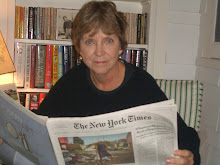That last item made me think of what I posted almost a year ago on Monday, October 27, 2008. Rather than make you search through the archives, I'll just post it again:
It occurred to me that by starting this blog, I have become your news butler, serving up tasty little tidbits of news to please you. That’s just what Nicholas Negroponte predicted would happen, but he was thinking of a robot, not a professor. “Don’t squirt more bits at me,” said the M.I.T. computer scientist and Internet visionary way back in the 90s. You gobble up millions of bits every day, by the way. Bits are the basic unit of information in this digital age.
Negroponte could already see that we would all soon be overwhelmed by the information coming at us through the Internet. What he wanted was not more bandwidth but “intelligence in the network and in my receiver to filter and extract relevant information.” That’s where the news butler or “interface agent” would come in. “Image a future where your interface agent can read every newspaper and catch every broadcast on the planet, and then, from this, construct a personalized summary.”
Writing in Wired magazine, he contended that we really don’t want more “info grazing” and “channel surfing.” We want help, help in making sense of it all. Maybe he’s not talking about a news butler but a blogger.
Or maybe Fast Flip!
Monday, September 21, 2009
Flip Through Some Pages -- Fast
Want to flip through newspaper and magazine pages fast, sampling the world press from your laptop? Goggle has just launched an experimental news hub called Fast Flip . It's sort of like flipping through the pages of publications at a newsstand. The site is organized by how popular (including recommendations and headlines), sections (such as "world," "health" and "opinion"), topics ("Serena Williams" and "swine flu") and sources (the publications that created the content).
The New York Times suggests that Google," long seen as a enemy by many in the news industry," is hoping to cast itself as media's friend by making it easier for readers to read newspapers and magazines. What do you think?
The New York Times suggests that Google," long seen as a enemy by many in the news industry," is hoping to cast itself as media's friend by making it easier for readers to read newspapers and magazines. What do you think?
Saturday, September 12, 2009
Information R/evolution
The Gutenberg Revolution -- introduction of the movable-type printing press in the 15th century -- revolutionized how human beings look at, organize, categorize, arrange the world. Because of the German Johannes Gutenberg, books began to have page numbers, indexes, tables of content and author accountability. Now in the 21st century, the Internet Revolution has changed the ordering of our world yet again.
Friday, September 11, 2009
How Images Change Our World
Today in class I mentioned the 1972 photo of a naked child fleeing a naplam attack in Vietnam. Shot by an Associated Press photographer, it is credited with changing American public opinion and ending the unpopular war. What a coincidence that a story about "Girl from iconic Vietnam photo inspires" popped up on my Yahoo! desktop tonight!
Why do you think it became one of the most haunting images of the war?
Why do you think it became one of the most haunting images of the war?
Tuesday, September 8, 2009
How Has Your World Changed?
That's the question BBC is asking its viewers and Web visitors in a series this month called Aftershock: How has your world changed? The series explores the global economic meltdown that began in September 2008 and has affected the Dubai work force. Visit BBC on television and also on the Web . The site has nifty interactive features, including a world map and a primer on recession basics and jargon. On TV, catch the dramatic promo -- international investment bankers throwing Molotov cocktails at riot police. Aftershock is a good example of television going behind breaking-news headlines. The associated website is a must-read for anyone wanting to know what's going on in the world today.
Monday, September 7, 2009
Once Upon A Time in Book Publishing...
Welcome to Fall Semester 2009. We've already started talking about technological revolutions in international communications and how Gutenberg's moveable-type printing press in the 15th century changed not only how manuscripts were reproduced but also changed our world. By the end of the 20th century, book publishing had acquired all sorts of new tools, including the typewriter. Have you ever seen a typewriter ? Read what a retired book publishing executive and literary agent says about the last century when "When Book Publishing Had Scents and Sounds." How many of the items she mentions have you ever used -- or even seen?
Subscribe to:
Comments (Atom)
